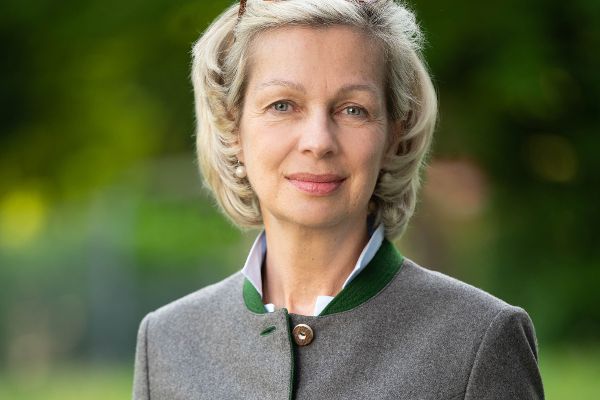Director-General Elfriede Moser in an interview with the Forest Dialogue team

Since 1 December 2023, Elfriede Moser has been the new Head of the Directorate-General of Forestry and Sustainability at the BML. Prior to this, she worked as Director of the Upper Austrian Provincial Forestry Administration in Linz.
In the interview with the Forest Dialogue team, she explains the main tasks of the Directorate General of Forestry and Sustainability and which challenges will require special attention in the future.
As Maria Patek's successor, you were appointed by Federal Minister Totschnig as Head of the BML’s Directorate General of Forestry and Sustainability, a Directorate General with a very broad and significant area of competence. You are now responsible for national and international forest policy, for the Forest Fund, the Wood Initiative and natural hazard management, but also for the coordination of forestry research and much more besides. Is it possible to see the individual tree in such a “forest of topics”?
This is undoubtedly a special challenge, but one that I was very happy to accept. The Directorate General of Forestry and Sustainability brings together a wide variety of tasks at several levels of activity, some of which have already been mentioned. I am particularly pleased that I can rely on an outstanding, experienced team. The task is always to see the detail, the individual, while thinking about the big picture. The sum of the individual trees is the forest stand.
In which areas do you expect the greatest challenges? Which topics do you think will require special attention in the future?
Naturally, the focal areas of work relate, on the one hand, to the current situation of forests and of the forestry and timber industry, where we need to set up - and implement - effective aids for the sector speedily - just one keyword being "the Forest Fund - the future package for our forests". This aside, we must continue to ensure that the data required to assess the situation and to make political decisions are provided. The main task here is to maintain and develop our high level of quality. Training and research in the forestry and timber sector are essential for improving our crisis management capabilities and for identifying innovative solutions. Another major field of action is monitoring the implementation of the Austrian Forest Strategy 2020. With the external evaluation of the Forest Dialogue process and of the Forest Strategy 2020 and the recommendations derived from it, we have created a good basis for successfully taking the next steps.
In general, it is very important in forest policy to find viable and balanced solutions. The involvement of forest owners, of those responsible for forest management and of all relevant stakeholders in the political decision-making process is of particular importance here.
This is currently a major issue especially on European level, where substantial changes are going on. Generally, networking is gaining importance at European and international level and Austria has placed a strong emphasis on this field for many years. Last but not least, our tasks also include informing society about forests and their importance and benefits. As a result of the crises and natural disasters, we can observe a process of rethinking that includes the status of forests. Forests are increasingly seen as a precious commodity that cannot be taken for granted. We can build on this rethinking process.
You have already briefly mentioned the Forest Dialogue. What contribution can the Austrian Forest Dialogue make to achieving the goals of the Directorate General of Forestry and Sustainability and how do you see the future of the Forest Dialogue?
For 20 years, the Austrian Forest Dialogue has been an exemplary dialogue process that has played a key role in shaping Austria’s forest policy. It has become a real brand. It is not a matter of course that over 85 organisations and institutions make their expertise and their resources available and have been actively involved in a policy-making process for such a long time. This shows the mutual appreciation that is lived in the Forest Dialogue and that is reflected in the jointly supported results of the Forest Dialogue. It is a process that is known far beyond national borders and that is the envy of many other countries. The Forest Dialogue has proven in the past that the best way to meet future challenges is to work together. With this in mind, I look forward to continuing our constructive collaboration for forests.
The team of the Forest Dialogue would like to thank you for the interview!